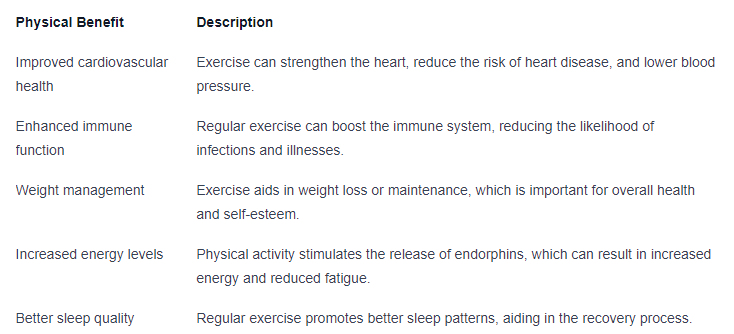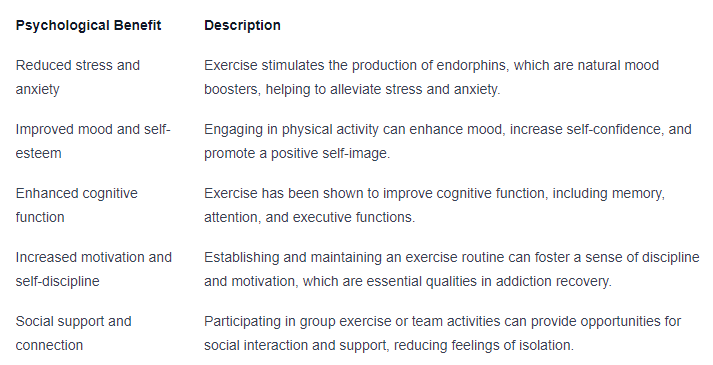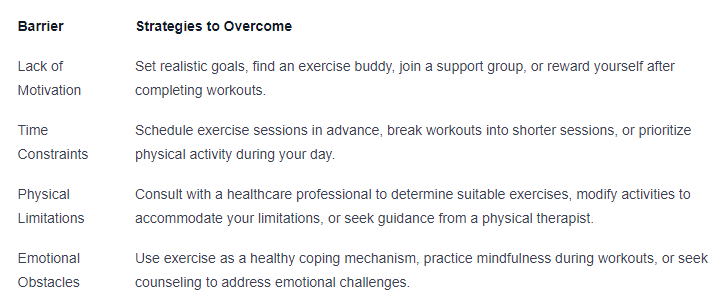The Relationship Between Drugs and Exercise for Your Addiction Recovery

Understanding Addiction Recovery
Embarking on the path of addiction recovery is a complex journey that requires dedication, perseverance, and support. It involves addressing the physical, psychological, and emotional aspects of addiction. In this section, we will explore the intricate nature of addiction recovery and the significant role that drugs and exercise play in the recovery process.
The Complex Journey of Addiction Recovery
Addiction recovery is a multifaceted process that goes beyond simply abstaining from drug use. It involves addressing the underlying causes of addiction, managing withdrawal symptoms, and developing coping mechanisms to maintain a drug-free lifestyle. Recovery is not a linear path, but rather a series of ups and downs, achievements, and challenges.
Recovering from addiction requires a holistic approach, encompassing various treatment modalities such as therapy, support groups, and medical interventions. It is crucial to tailor the recovery process to meet the individual's specific needs, taking into account their unique circumstances and challenges.
The Role of Drugs and Exercise in the Recovery Process
Drugs, both pharmaceutical and behavioral, are essential components of addiction recovery. Medications may be prescribed to aid in detoxification, manage withdrawal symptoms, or address any co-occurring mental health disorders. Behavioral therapies, such as cognitive-behavioral therapy (CBT) and motivational interviewing, help individuals develop healthy coping mechanisms and address maladaptive patterns of thinking and behavior.
Exercise also plays a crucial role in addiction recovery. Physical activity can have numerous benefits for individuals in recovery, both on a physical and psychological level. Engaging in regular exercise can help to improve overall physical health, reduce cravings, alleviate stress and anxiety, and enhance mood.
To better understand the impact of drugs and exercise in addiction recovery, let's take a closer look at the specific benefits they provide and how they work together to support recovery.
The Impact of Drugs on Addiction Recovery
When it comes to addiction recovery, understanding the impact of drugs on the process is crucial. Drugs can have profound effects on both the brain and the body, making the journey to recovery challenging for individuals struggling with addiction.
How Drugs Affect the Brain and Body
Drugs exert their influence on the brain by targeting the reward system, which is responsible for feelings of pleasure and motivation. They do this by flooding the brain with dopamine, a neurotransmitter associated with pleasure and reward. Over time, drug use can lead to changes in the brain's structure and function, making it difficult for individuals to experience pleasure from natural rewards, such as food or social interactions.
Different drugs affect the brain and body in specific ways. For example, stimulant drugs like cocaine and methamphetamine increase dopamine levels, leading to heightened energy and euphoria. Depressant drugs, such as opioids and benzodiazepines, slow down brain activity, inducing relaxation and pain relief. Hallucinogens, like LSD and psilocybin, alter perception and can cause hallucinations.
The long-term use of drugs can result in addiction, a chronic brain disease characterized by compulsive drug-seeking and use, despite negative consequences. Breaking free from drug addiction requires addressing both the physical and psychological aspects of dependence.
The Challenges of Overcoming Drug Dependency
Overcoming drug dependency is a complex and challenging process. The physical and psychological withdrawal symptoms experienced when discontinuing drug use can be intense and debilitating. These symptoms vary depending on the drug used and the individual's unique circumstances.
Some common physical withdrawal symptoms include:

In addition to physical symptoms, individuals also face psychological challenges during addiction recovery. These may include intense cravings, mood swings, anxiety, depression, and difficulties in managing stress. The psychological impact of addiction can persist even after the physical withdrawal symptoms have subsided.
It's important to note that the journey to recovery is highly individualized, and the challenges faced can vary from person to person. Seeking professional guidance and support from addiction specialists, counselors, and support groups can significantly increase the chances of successful recovery.
Understanding the impact of drugs on addiction recovery is a crucial step towards developing effective strategies to overcome dependency. By addressing both the physical and psychological aspects of addiction, individuals can embark on a path to long-term recovery and a healthier, drug-free lifestyle.
The Power of Exercise in Addiction Recovery
Exercise plays a crucial role in addiction recovery, offering both physical and psychological benefits that can greatly support the journey towards a drug-free life. Incorporating regular exercise into the recovery process can contribute to improved overall well-being and increased chances of long-term success.
Physical Benefits of Exercise
Engaging in regular physical activity during addiction recovery has numerous physical benefits. Exercise helps to restore and improve physical health, which may have been compromised due to substance abuse. Some key physical benefits of exercise in addiction recovery include:

By reaping these physical benefits, individuals in addiction recovery can experience improvements in their overall physical health, helping them regain vitality and strength.
Psychological Benefits of Exercise
In addition to the physical benefits, exercise also provides valuable psychological benefits for individuals on the path to addiction recovery. Regular physical activity can positively impact mental health and emotional well-being. Some psychological benefits of exercise in addiction recovery include:

The psychological benefits of exercise can significantly contribute to the emotional well-being and overall mental health of individuals in addiction recovery, aiding them in overcoming challenges and maintaining sobriety.
By recognizing and harnessing the power of exercise in addiction recovery, individuals can experience a multitude of physical and psychological benefits that support their journey towards a drug-free life. Incorporating regular exercise, tailored to individual needs and preferences, can play a pivotal role in achieving long-term success and overall well-being.
The Synergistic Relationship Between Drugs and Exercise
In the journey of addiction recovery, both drugs and exercise play essential roles. While drugs are used in a therapeutic context to aid recovery, exercise provides its own unique benefits that complement the recovery process. Understanding the synergistic relationship between drugs and exercise can provide valuable insights into how they can work together to support addiction recovery.
Complementary Effects of Drugs and Exercise in Recovery
Drugs used in addiction recovery, such as medication-assisted treatment (MAT), can help individuals manage withdrawal symptoms, reduce cravings, and restore balance in the brain. These medications, when prescribed and monitored by healthcare professionals, can be effective tools in overcoming drug dependency. They provide a foundation for individuals to stabilize their physical and mental well-being during the recovery process.
On the other hand, exercise offers a range of benefits that can support addiction recovery. Regular physical activity has been shown to improve overall mood, reduce stress and anxiety, and enhance mental well-being. Exercise stimulates the release of endorphins, which are natural mood-boosting chemicals in the brain. This can help individuals in recovery experience a sense of pleasure and satisfaction, reducing the desire for the euphoria previously obtained through drug use.
Additionally, exercise provides a healthy outlet for stress relief and emotional regulation. It can serve as a constructive way to cope with the challenges and emotions that often arise during the recovery process. Engaging in physical activity can help individuals develop healthier coping mechanisms, which can be crucial in maintaining sobriety.
How Exercise Can Support Drug-Free Living
Exercise not only complements the effects of drugs in addiction recovery but also plays a significant role in supporting drug-free living. By incorporating regular exercise into their lifestyle, individuals in recovery can experience several benefits:
- Improved Physical Health: Exercise promotes cardiovascular fitness, strengthens muscles, and enhances flexibility and balance. It helps individuals regain physical well-being that may have been compromised during their addiction.
- Enhanced Mental Well-being: Physical activity has been shown to reduce symptoms of depression and anxiety. It can improve self-esteem, boost confidence, and provide a sense of accomplishment and purpose in recovery.
- Establishing Healthy Routines: Engaging in regular exercise can assist individuals in creating structure and routine in their daily lives. This can be particularly valuable during the transition from a drug-dependent lifestyle to a drug-free one.
- Building a Supportive Community: Participating in exercise classes, group activities, or sports can help individuals connect with others who share similar interests and goals. This sense of community and support can be instrumental in maintaining motivation and accountability in recovery.
By incorporating exercise into their recovery journey, individuals can experience the combined benefits of drugs and exercise, leading to a more holistic and sustainable approach to addiction recovery.
In the next section, we will explore practical ways to incorporate exercise into your recovery journey, including finding the right exercise routine, overcoming barriers and challenges, and seeking professional guidance.
Incorporating Exercise into Your Recovery Journey
When it comes to addiction recovery, incorporating exercise into your journey can have numerous benefits for both your physical and mental well-being. Finding the right exercise routine, overcoming barriers and challenges, and seeking professional guidance are important steps to ensure a successful integration of exercise into your recovery process.
Finding the Right Exercise Routine
Finding the right exercise routine is crucial to ensure that it suits your needs, preferences, and physical capabilities. Consider the following factors when selecting an exercise routine:
- Interests and Enjoyment: Choose activities that you find enjoyable and engaging. This will increase your motivation to stick with the routine.
- Physical Fitness Level: Start with exercises that match your current fitness level. Gradually increase the intensity and duration as your fitness improves.
- Variety: Incorporate a variety of exercises to keep your routine interesting and prevent boredom. This can include activities such as walking, jogging, cycling, swimming, yoga, or group fitness classes.
- Schedule and Accessibility: Select exercises that fit into your schedule and are easily accessible. This will make it more convenient for you to consistently engage in physical activity.
Remember, the goal is to incorporate regular exercise into your daily routine, so choose activities that you genuinely enjoy and look forward to.
Overcoming Barriers and Challenges
When incorporating exercise into your recovery journey, you may encounter various barriers and challenges. It's important to identify and address these obstacles to maintain consistency and motivation. Here are some common barriers and strategies to overcome them:

By proactively addressing and finding solutions to these barriers, you can overcome challenges and make exercise a consistent part of your recovery journey.
Seeking Professional Guidance
Seeking professional guidance is highly recommended when incorporating exercise into your recovery journey, especially if you have pre-existing medical conditions or are unsure about the right approach. Here are some professionals who can provide valuable support:
- Medical Professionals: Consult with your healthcare provider, such as a doctor or addiction specialist, to ensure that exercise is safe and appropriate for your specific circumstances.
- Fitness Trainers: Work with a certified fitness trainer who has experience in working with individuals in addiction recovery. They can help design a personalized exercise program based on your needs and goals.
- Counselors or Therapists: Engage with a counselor or therapist who specializes in addiction recovery. They can provide guidance on how to integrate exercise into your overall treatment plan and address any emotional or psychological factors related to exercise and addiction.
Remember, professional guidance can provide you with the necessary support and expertise to make informed decisions and ensure your exercise routine aligns with your recovery goals.
Incorporating exercise into your addiction recovery journey can have a profound impact on your overall well-being. By finding the right exercise routine, overcoming barriers and challenges, and seeking professional guidance, you can enhance your recovery process and promote a healthier, balanced lifestyle.
Conclusion
In conclusion, the journey to addiction recovery is complex and multifaceted. By understanding the physical and psychological impact of addiction, individuals can develop effective strategies to overcome dependency and maintain a drug-free lifestyle. Exercise plays a crucial role in addiction recovery, offering numerous physical and psychological benefits that complement the recovery process. By incorporating regular exercise into their journey, individuals can experience improved overall well-being, enhanced mental health, and increased chances of long-term success.
Overcoming barriers and seeking professional guidance are important steps in ensuring a successful integration of exercise into the recovery process. Through a holistic approach that addresses both physical and psychological aspects of addiction, individuals can embark on a path towards lasting recovery and a healthier, fulfilling life.
